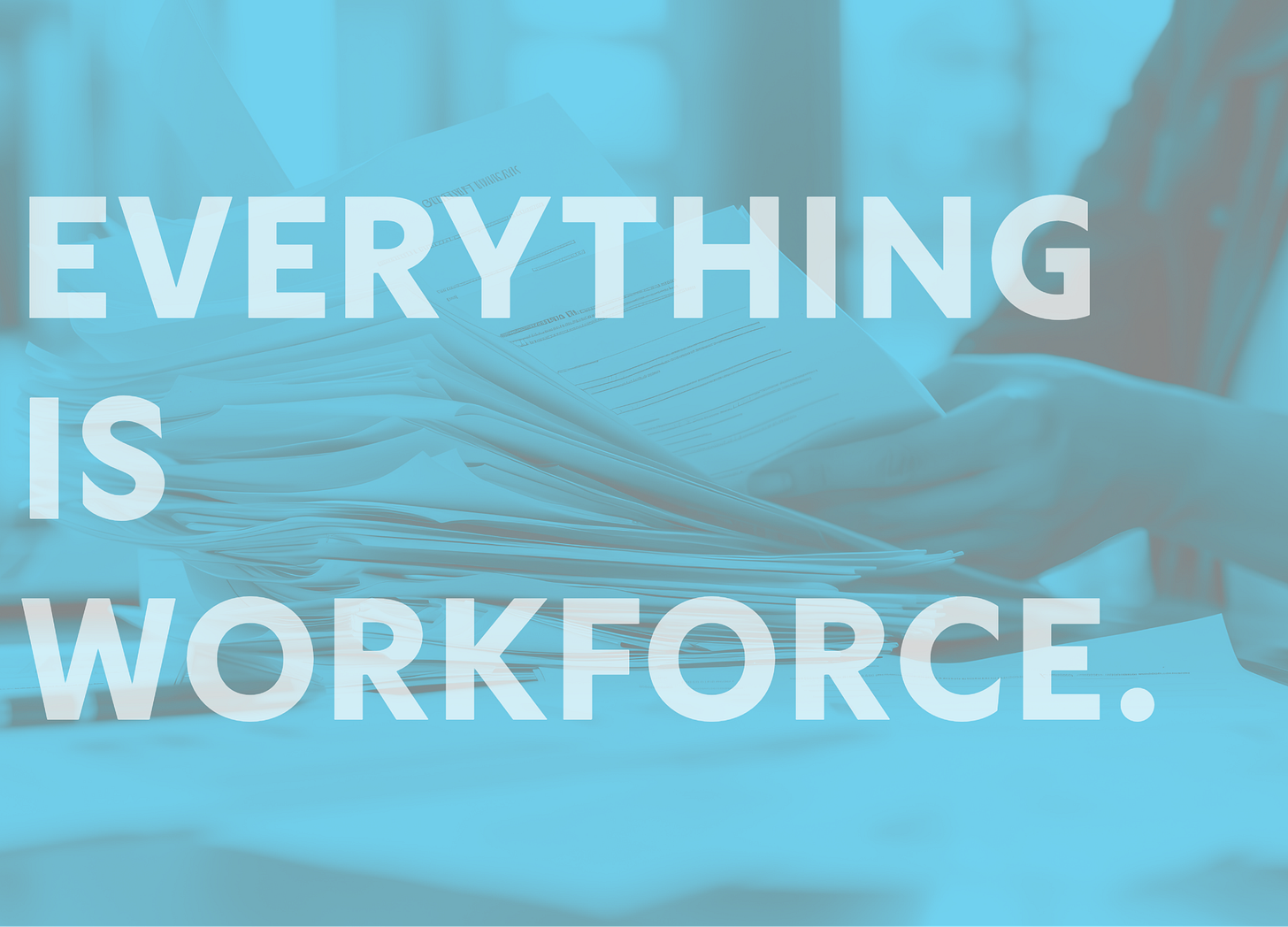The problem with skills-based hiring? Hiring.
Why ending degree requirements hasn’t led to more jobs for people without degrees, and how to start working on it.
The issue
A lot of companies and governments are talking about removing degree requirements and hiring based on skills. That doesn’t mean they’re actually doing it.
Wait, what?
Lots of employers have made a big deal about ending college degree requirements and hiring based on skills:
One in three employers have removed degree requirements.
27 states have removed degree requirements from their hiring processes.
Congressed passed a law late last year to promote the consideration of skills in the federal hiring process.
In theory, skills-first hiring1 could be a key to eliminating barriers to good-paying jobs to hard-working prospective employees. Half of all hires are unsuccessful under the hodgepodge of paper and connections that makes up the “traditional” recruiting and hiring process. Dropping degree requirements for jobs that don’t need them—and refocusing hiring around skills evaluation and assessment during the hiring process—could give more people more opportunities while making hiring much more effective. Employers surveyed on the topic report skills-first hiring saves time and money and results in better, longer-lasting hires.
So how many people without degrees got hired because of the mass movement to end degree requirements? Well, here is what the Burning Glass Institute concluded in a report published last year:
Overall, by our estimates, that has translated to new opportunity for only approximately 97,000 workers annually, out of 77 million yearly hires. Put differently, for all its fanfare, the increased opportunity promised by Skills-Based Hiring has borne out in not even 1 in 700 hires [in 2023]. Just as importantly, that progress isn’t shared uniformly across all firms that adopted skills-based policies. Rather, we found that nearly all of the change in actual hiring was driven by 37 percent of the firms we studied that removed degree requirements.
OK, so not ideal.
To me, much of the challenge here is that employers and policymakers have misunderstood skill-first hiring as they all rush to catch the trend. For one, skills-first hiring isn’t, and shouldn’t, be centered on just ending unneeded degree requirements.
The more effective way of thinking about skills-first hiring is “hiring or promotion of workers around skills, knowledge, and abilities that workers can show they actually have, regardless of how or where workers got those skills,” as the Departments of Labor and Commerce described it in a guide2 that happened to be developed by a noted newsletter writer (me).
That doesn’t mean that degrees have no value, or that the goal here is to get rid of degrees—people with degrees can benefit quite a bit from skills-first hiring. The goal is to better account for skilled people whose journey may not fit into a box. Sometimes they will have a degree, sometimes they won’t.3
Which gets to the other, bigger challenge with skills-first hiring obscured by all the degree-requirement dropping:
Skills-first hiring can’t fix your hiring if you don’t actually fix your hiring.
Explain yourself.
After two years studying what it takes to do skills-first hiring really well, and talking to smart people who have helped employers do the work, here are a few things I think can help do it much more than just eliminating a degree requirement:
Knowing the specific duties a job actually does.
Staying consistent on the qualifications and criteria for hiring.
Running the hiring process in a consistent and objective way without favor toward a person carrying more weight than actual evidence.
With all love, employers don’t have a strong track record at doing any of these things when it comes to hiring. Sometimes for somewhat justifiable reasons, sometimes for totally horrible ones. To take a brief vacation from abject nihilism, let’s explore the former possibility.
Hiring managers’ biggest enemy can be The Resume Pile. If you ever wonder why there is so much conflicting advice on getting a job, The Pile is why.4 The Pile is part of why people have a better chance of getting hired through networking and people they know over cold applications. Networking and connections can be imperfect markers of actual talent and perpetuate racial and socioeconomic divides; however, if you’re a tired and bedraggled hiring manager, a familiar face you like is a lot easier to commit to than journeying into The Large Faceless Resume Pile and figuring out if anyone there can do the job better.
And once something seems to kind of worked once, organizational inertia comes into play. It’s hard to make people change at work anyway, and if there is a break in the system, well, you probably benefited from it, didn’t you? Better not start changing now.
That’s a lot of mess, much of it revolving around the unique interactions of personalities in specific workplaces and the circumstances of the hire. Or, to put it another way:
And if everything is in play, ending a degree requirement is just an additional drop of context, not a cure.
So?
To put a fine point on it, if you don’t actually adjust hiring processes that prevent hiring people based on their skills, you won’t be able to actually hire people based on their skills.
What should we do about it?
There is no magic cure here. Change is hard, and it can go off rails in many ways.
The smart people I trust on this work talk plenty about the importance of buy-in. You need it from management to get the process started, and you need it from workers to make sure it happens right. Wins and proof of concept help with that.
For some more specific ways to do that, check out that guide we put together at DOL while you still can. In the meantime, I have two immediate steps—one for employers, one for governments—that I think can help build momentum toward the things that actually get people without degrees hired.
Employers: Draft the shortest and easiest to read job description you possibly can.
You can’t settle on what skills a job needs to hire until you can fit what the job does into something smaller than a novella. I won’t call out particular listings to be polite, but many employers struggle with this, especially if they’re trying to pack two or more roles into the one worker they really want to hire.
People tend write too much when they’re trying to do too much. My recommendation is fit your job’s responsibilities into five buckets that can be summarized in no more than two sentences, then list no more than two or three duties under those responsibilities. Make it under two pages if you can.
It’s an arbitrary framework, but arbitrary frameworks can be useful in helping people find their way to the next step.
Federal and state government: Send money toward the pieces that make skills-first hiring work, not just the idea of skills-first hiring.
With the obvious big caveat right now, governments can use money as a motivator to get employers to start this process.5 A noted newsletter writer may have started work in this direction while inside the government, crafting policies where showing use of skills-first hiring techniques met certain grant requirements.
To slightly diminish the work of this clever fellow: “showing use of skills-first hiring techniques” doesn’t mean an employer has actually done the work to do skills-first hiring successfully. A more effective route to encourage adoption would be breaking down the components in the process and prioritizing them in points-based grants competitions.
For example, the competition could provide more points to applicants who show they have streamlined their job descriptions into the two-page, five-bucket approach above. To offer another example: the government could provide higher scores to applicants who share a list of skills-based interview questions or an overview of their hands-on process of gauging work-related skills. This approach rewards both employers who have made the change and motivates a try from those who have not.
Has it been a month already?
Yes… yes, it has been.
Thanks for joining me so far. I am building a new platform from scratch, and the launch is ahead of schedule on many of the things that matter. This edition going up on time is a tiny miracle after I got sick over the weekend. I don't know much about what happened on Saturday because I was asleep. For once, that’s not a bit about Alabama losing to Auburn.
The pay wall goes up this weekend. These Tuesday editions on big topics in workforce will be free for everyone, but starting next week, the Friday grants listings and everything else in between will be for paid subscribers only. The early-bird special on annual subscriptions also goes away on Friday. The good news, though, is that the monthly price remains $10 a month.
The monthly price has to match the quality of the jokes, I’m told.
I’m in trouble.
Card subject to change
Absent antics and calamity, I’ll be back a couple more times this week thanks to the delayed confirmation hearing:
WEDNESDAY: Live-posting on Bluesky during Labor nominee Lori Chavez-DeRemer’s weather-delayed confirmation hearing. Republican support could wane due to LCD taking appointments at Planned Parenthood nearly forty years ago. Democratic votes may be needed. Fellow Oregonian, Sen. Jeff Merkeley, withdrew his support because of DOGE, and Pennsylvania Tall Sen. John Fetterman has said he will vote for her because of her past labor support.
Conditions seem right for a weird one on Wednesday.
THURSDAY: A readout on the confirmation hearing.
FRIDAY: Grants listings with a little analysis of which workforce grantees ought to to be closely eyeing the House and Senate budget debates.
NEXT TUESDAY: Political leaders love the “social alchemy” at the heart of many workforce programs. Can they love the people who actually need the help?
While I use “skills-based” in the headline as the most common reference, I’m using “skills-first” over “skills-based” here because it is the preferred term by practitioners in this area and it also carries the point a little better. You’re asking employers to look at skills first, instead of culling applications out of the pool based on big and often-arbitrary criteria that can cost them hirable talent.
While you can, please download and enjoy the Skills-First Hiring Starter Kit, a best-in-class, under-15-minute read on how private employers can start hiring better based on skills, a product boosted through the expertise of 16 organizations and companies from across the political spectrum.
The Starter Kit briefly disappeared from federal websites after the Inauguration, but it recently reappeared. I don’t know the particulars, and we’ll see what happens if it goes away again as DOGE keyword searches continue.
Sometimes they’ll be veterans who struggle to find work in the private sector because of lack of knowledge of their credentials. Skills-first hiring might be helpful in staving off an unemployment crisis for veterans since the federal government likely just fired a number of them.
One time, the lore says, the personalized cover letter really did seal the deal. The resume was longer than a page and it still worked!
Skills-first hiring is an area where the Trump Administration appears to have some internal divide. Project 2025 supports skills-first hiring, but disagrees on how to expand it. Its main text suggests legally barring employers from sifting out candidates because they don’t have college degrees. The “alternative viewpoint” rejects this premise and says that employers should be able to use degrees as a filter if they want to do so, although it supports expansion of skills-first hiring.





